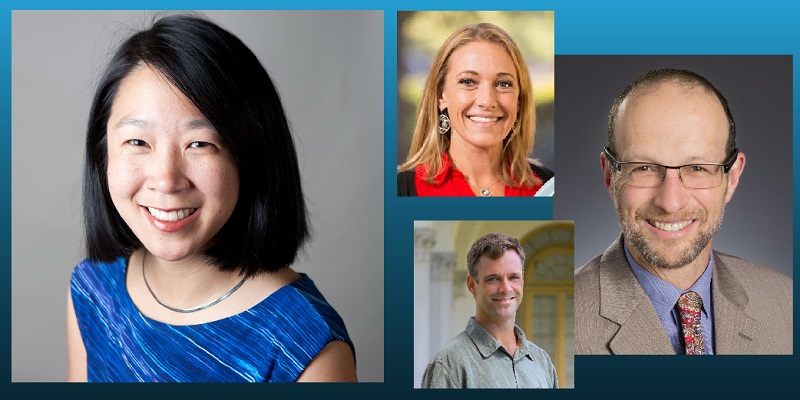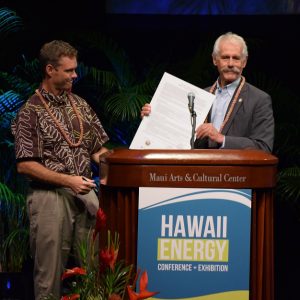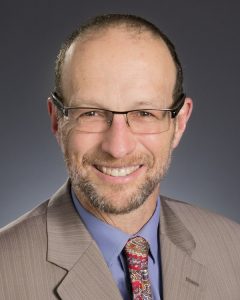
Keynote speaker, MOU Signing and more at the 2020 Hawaii Energy Conference

Rachel Huang, Director of Energy Strategy, Research and Development for Sacramento Municipal Utility District (SMUD), will be the keynote speaker at the 2020 Hawaii Energy Conference
The Director of Energy Strategy, Research and Development for Sacramento Municipal Utility District (SMUD), Rachel Huang, will be the Keynote speaker for the 7th Annual Hawaii Energy Conference (HEC) on Day 1. Presented by Maui Economic Development Board (MEDB), the two-day conference is on March 18 & 19 at the Maui Arts and Cultural Center.
The HEC will take a deep dive into how electrification can be “beneficial” and what is required to design an equitable energy transition. SMUD, a nonprofit power company, is on the forward edge of power-grid technology, successfully integrating distributed renewable-energy resources into its energy mix.
In her role at SMUD, Huang oversees the development of strategy for new business models, demonstrations, and evolution of utility functions in the face of an increasingly distributed energy future. Her responsibilities include the development of the strategic roadmap for distributed energy resources, the research and demonstration of innovative and emerging technologies, and the coordination of their execution across the enterprise.
Jennifer Potter, member of the Hawaiʻi Public Utilities Commission, observed, “Rachel Haung hired me at SMUD 10 years ago as a demand side specialist. Under her leadership, I developed a deep understanding of what it means to provide outstanding service our community thorough programs and services developed for every customer, in every sector. She is a beacon of light for our industry.”
Huang also serves on the board for the Consortium for Energy Efficiency (CEE) and represents Region 6 on the American Public Power Association’s Demonstration of Energy & Efficiency Development (DEED) Program Board.
“For more than a decade, Rachel Haung has been a thought leader for customer focused programs and services,” remarked Frank De Rego Jr, Vice Chair of the Conference and MEDB’s Director of Business Development Projects. “She has led numerous teams at SMUD that have developed innovative solutions that streamline interconnection practices for DERs (Distributed Energy Resources), advanced programs that provide services to underserved communities, and effectuated SMUD’s research and development DER activities.”

The 2019 MOU signing between California and Hawaii committing to 100-percent clean-energy goals. L to R: James Griffin, Chairman Hawaii PUC; Michael Picker, President California PUC
The HEC program will also feature a signing of a Memorandum of Understanding (MOU) with California on climate change. “Hawaii will be the sixth state to join the Western Public Utility Commissions’ (PUC) Joint Action Framework on Climate Change,” said Potter. The MOU affirms a commitment to ensure that investor-owned utilities operate in a manner that protects human health and safety, the environment, and ratepayers from risks related to carbon pollution.

Clifford Rechtschaffen, Commissioner California PUC
James Griffin, Chairman of the Hawaii PUC will be joined on stage by Clifford Rechtschaffen, Commissioner for the California PUC, for the formal signing of the MOU. Rechtschaffen will also speak on a panel titled ‘Catching up with the Commission. Hawaii PUC Initiatives such as Performance Based Regulation.’ Moderated by Potter, the other two panelists will be Cara Goldenberg of the Rocky Mountain Institute and Mark Kolesar, Chair of the Alberta PUC.
Other confirmed speakers on the program include: Governor David Ige; Scott Seu, President of Hawaiian Electric; Jenna Tatum, Director, Building Electrification Initiative; Nate Hix, Founder, Living Wage Hawaii; Nicole Velasco, NORESCO and Murray Clay of Ulupono Initative.
Panels on electrification will answer the questions — What are the benefits, challenges, and practical limits of electrification? Given the wildfire issues affecting the West, will there be the same access to electricity for those who cannot afford microgrids or DERs? Can an electrified system be more resilient and efficient? What are the alternatives to electrification?
Regarding equity, panels will explore what does an equitable energy transition look like? How can we break through economic, cultural and linguistic barriers to ensure that we have an energy system that works for everyone? Where should we invest and put equity into equity? Is it possible to create a transition that respects local cultures, is socially just, and protects our most vulnerable?
“I enjoy the lively debates among panelists,” said Tricia Rohlfing, 2020 HEC Program Committee member and Vice President of Finance at Hawaii Pacific Solar. “I can recall one particular panel discussing the future of battery storage where panelists had very different takes on how that might look. Those differing opinions are important for everyone to hear and contemplate, especially those setting policy.”
The conference consistently attracts energy industry leaders from Hawai’i, Continental US, Japan and Europe to exchange ideas on how to better serve customers in the Islands’ rapidly changing energy environment. Participants can take advantage of the ample networking time and have access to the leading experts in the state.
The Hawaii Energy Conference is supported by the County of Maui Office of Economic Development and Sponsors: Hawaii Clean Power Alliance, Hawaii Natural Energy Institute and Ulupono Initiative; Hawaii Energy; Hawaii State Energy Office; Hawaiian Electric, Johnson Controls, Powin Energy; 174 Power Global; Burns & McDonnell; Carbon Lighthouse; Kauai Island Utility Cooperative, Opus One Solutions and Society of Petroleum Engineers.
